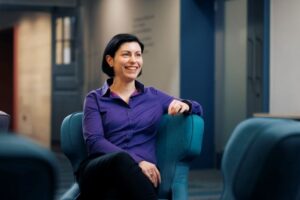As part of a new series, we will feature some of the people who work for BMJ Supportive & Palliative Care.
Cindy Forbes, Research Fellow at The University of Hull, Hull, UK

Hello Dr. Forbes. Where do you work?
I work at the University of Hull in the UK
What roles do you currently hold?
Lecturer in Physical Activity
Tell us about your career journey.
I always was a sporty person and I started my Bachelor degree intending to be a sport physiotherapist but then after my second year, I thought I would go into medicine. In my third year, I was a teaching assistant and helping people learn and understand the course was exceptionally rewarding. This set me on a path to becoming a professor. Post BSc I worked for two years as a lab instructor in anatomy & physiology, then embarked on a MSc in Health Promotion, followed by a PhD in Exercise Oncology, both from the University of Alberta. I completed Postdoctoral work at Dalhousie University and a Visiting Research Fellowship at the University of Adelaide. Finally, I was awarded a Yorkshire Cancer Research Career Development Research Fellowship at the Hull York Medical School, where I am now a Lecturer!
What attracted you into Palliative/Supportive Care?
In my Bsc, I took a course called Advanced Exercise Physiology. We learned that exercise could help prevent and manage chronic diseases such as cardiovascular disease, diabetes, and even cancer! Such a significant outcome from something (I thought) was so easy to do, why wasn’t everyone active all the time? My MSc opened my eyes to the psychology and behavioural science side of things; it was not so simple after all. Since my PhD, my research has focused on how physical activity, sedentary behaviour, and nutrition impacts quality of life and clinical outcomes among people diagnosed with cancer and how digital technologies can help deliver and support these behaviours. My aim is to help people with a cancer diagnosis live as well as possible for as long as possible.
What tips do you have for early researchers?
First and foremost, be kind to yourself. It is often a rocky road and there are usually more downs than ups in the beginning. Take time to recharge when you need it because your outputs will be better in the end. Secondly, try to meet and talk to lots of different people in and outside of your field. There are so many clever people out there that can give you a different perspective on your work and potentially even be collaborators down the line. Collaboration is the key to excellent research.
Who is/was your inspiration?
I think I have had a few people inspire me and be role models over the years. Family, friends, and educators who believed in me and supported me throughout my many years of education and fixed term appointments. I have been fortunate to have, in the past and present, supportive and kind supervisors who push me when needed and understand when I need a break. However, my mind always goes back to my great aunt when I think about people I wanted to be like. Independent, driven, kind, clever, and fearless.
What is your favourite novel?
I very much enjoy pretty much any novel by Jasper Fforde (https://www.jasperfforde.com/). His Thursday Next series is engaging and fun but in particular one quirky interesting story of his is called Shades of Grey. It’s a story I have read multiple times. Always enjoy it.
If you could choose a different career, what would it be?
I would have my own business for pet care and pet sitting. Dog walking, cat visits, boarding pets, etc. I have always loved animals but when I was young the only career I really knew about with animals was being a vet. I thought it would make me sad to see sick and injured animals all the time so didn’t pursue that. It never occurred to me at the time that there were potentially other avenues!